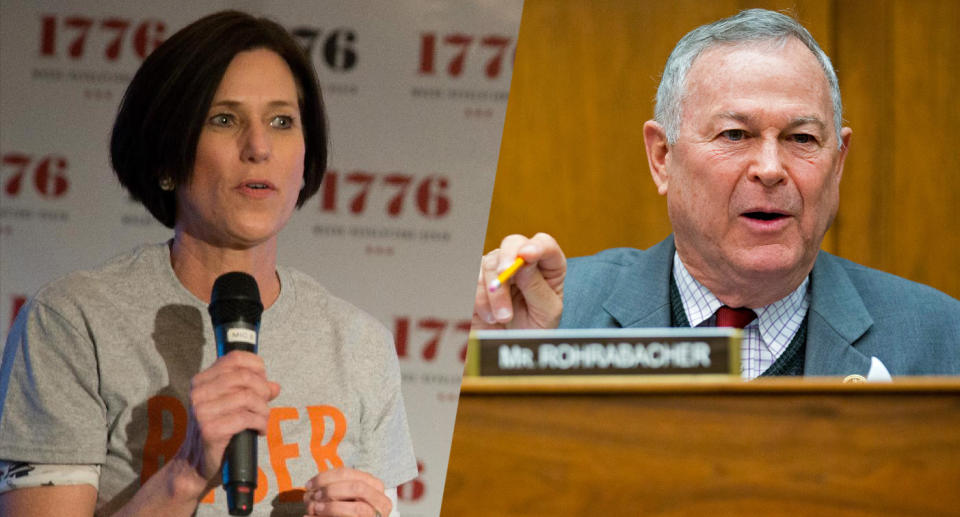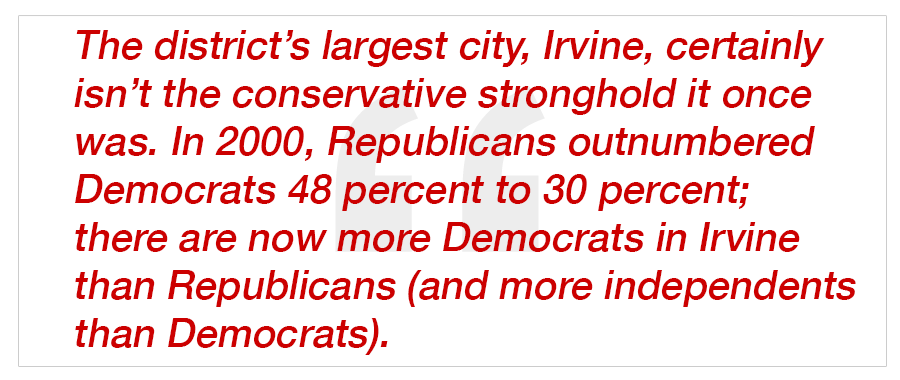Can Democrats find the right candidates to win back the House? Look to Orange County for clues.

LOS ANGELES — Encouraged by a long history of the president’s party losing seats in midterm elections — and emboldened by the historic unpopularity of this particular president, Donald Trump — Democratic candidates are launching challenges to congressional GOP incumbents earlier and more eagerly than at any time in recent memory.
But are they the right kind of Democratic candidates? You know, the kind who might actually be able to unseat entrenched House Republicans in 2018?
One place to look for clues is Orange County, Calif. Despite its conservative past — the county voted for the GOP candidate in every presidential election from 1936 to 2012 — the O.C. now overlaps with the districts of four of the 25 most vulnerable Republicans in Congress: Reps. Darrell Issa, Dana Rohrabacher, Mimi Walters and Ed Royce. Hillary Clinton won there by 9 percentage points. The Democratic Congressional Campaign Committee is planning to run its Western operations out of Irvine. A growing Latino population, a concentration of college-educated whites and a declining GOP registration advantage are making the area more and more treacherous for Republicans, especially with Trump in the White House.
“It’s districts like these that will decide whether the Democrats can make a serious run at control of the House,” the New York Times’ Nate Cohn recently wrote.
The opportunity, in other words, is there. The question is whether Democrats can capitalize. For that, they will need to recruit candidates who can win.

In Orange County, the party has no shortage of challengers to choose from. The midterms are still 18 months away, but already 10 O.C.-area Dems have declared their candidacies. (Four are gunning for Rohrabacher, three for Walters, two for Issa and one for Royce.) It’s a diverse group: former CSU-Fullerton chemistry teacher Phil Janowicz; environmental lawyer Mike Levin; Capitol Hill aide Kia Hamadanchy; UC-Irvine law professor Dave Min; and repeat contender Doug Applegate, a retired Marine colonel who lost to Issa last time by a mere 1,621 votes in what was the closest congressional race in the country.
But two candidates in particular exemplify the dueling templates that seem to be emerging nationwide as more and more Democrats toss their hats into the ring for 2018: Harley Rouda, who’s running against Rohrabacher, and Katie Porter, who’s running against Walters.
Rouda is Mr. Practical. Porter is Ms. Passion. Both are serious contenders, based on endorsements, fundraising and experience. But the differences between them highlight the larger dilemma that Democrats face heading into 2018: What’s the best way to win back the House? By fielding progressive, high-minded populists in tune with the national anti-Trump “resistance”? Or by pushing traditional, establishment-friendly contenders whose views and backgrounds more closely align with the districts they’re running in?
It’s hard to think of a more “Laguna Beach” candidate than Rouda. The son of a successful real estate entrepreneur who went on to found his own residential brokerage, Real Living, Rouda, 56, looks like he could have been one of the slick, smiling dads on the mid-aughts MTV reality show named for his wealthy, white, largely conservative hometown.
In fact, Rouda used to be a Republican himself: Between 1993 and 2007, he donated at least $9,200 to GOP congressional candidates, and during the 2016 Republican presidential primary he gave $1,000 to Ohio Gov. John Kasich, an old friend. Though Rouda voted for Clinton in November, and though he insists that he’s been “100% Democratic and strongly for Democratic values” since at least 2004, many local activists are skeptical. “Some people think Harley is a Republican in disguise,” Sue Dvorak of Indivisible OC 48 recently told the Orange County Register.
Yet Rouda’s Republican vibe could be his biggest asset next June, when he and the rest of California’s 2018 congressional candidates go head-to-head in the state’s “jungle primary” contest. (The top two finishers continue to the general election regardless of party affiliation.) As Dvorak herself noted in the next breath, “Some think [Rouda will] be able to appeal strongly to more voters throughout the district because of his background.”

Rouda’s business ties have already helped him raise an impressive $215,000 in the first quarter of 2017, putting him on par with Rohrabacher, who typically wins by 20-plus-point margins but who’s had only one serious Democratic opponent since joining Congress in 1989. Early endorsements have come almost entirely from local luminaries, including Laguna Beach Mayor Toni Iseman and former Orange County Democratic Party Chair Frank Barbaro. Given Rohrabacher’s closeness to Trump and his increasingly toxic views on Russia — he was once described as “Vladimir Putin’s favorite congressman” — it’s possible Laguna Beach and the surrounding areas could settle on Rouda as a palatable (if more liberal) alternative in 2018.
“I don’t see a willingness of either party to come to the middle,” Rouda said at a recent fundraiser in Laguna Beach, emphasizing his conciliatory centrism. “I think we need to focus on the people, not the party.”
Katie Porter, meanwhile, represents the Democratic Party’s other 2018 model: the passionate progressive. Educated at Yale College and Harvard Law School, Porter studied under future Massachusetts Sen. Elizabeth Warren and went on to become a prominent consumer advocate lawyer herself. The two co-authored the 2014 edition of “The Law of Debtors and Creditors,” and Warren endorsed Porter the same day she announced her candidacy.
“[Porter’s] been in the trenches with me fighting for families for nearly two decades and she’s gotten real results,” Warren said in her endorsement statement. “She’s fought relentlessly for important protections that safeguard consumers and force banks to give families a fair shake. There’s no one I trust more to take on Donald Trump and the entrenched special interests in Washington on behalf of working families.”
Unlike Rouda, Porter doesn’t talk about meeting Republicans in the middle; instead, she promises to battle them on behalf of the little guy, echoing the populist pleas of Warren and Bernie Sanders. “The powers in Washington have favored Wall Street banks over middle-class families,” Porter said in her campaign announcement. “I’ve spent my career fighting powerful interests. I’m running to take that fight to Washington.”

Porter has the résumé to back up her rhetoric. Before the housing bubble burst, she was one of the first to sound the alarm about Wall Street’s predatory practices, and in March 2012, she was appointed by then-California Attorney General Kamala Harris to serve as the state’s independent monitor of banks in a nationwide $25 billion mortgage settlement. (Harris, now California’s junior senator, has also endorsed Porter.)
How well Porter’s populism plays in CA-45 remains to be seen. The district’s largest city, Irvine, certainly isn’t the conservative stronghold it once was. In 2000, Republicans outnumbered Democrats there 48 percent to 30 percent, with independents making up 18 percent of the voter rolls; today, there are more Democrats in Irvine than Republicans (and more independents than Democrats). With a burgeoning foreign-born Asian population and the highest percentage of master’s degrees in the county, Irvine isn’t likely to look fondly on Trump, which is why Porter is hitting Walters hard for siding with the president on dismantling Obamacare. Clinton won Walters’ district by 3 percentage points, and so far, Walters, who lives outside the district, has refused to break with Trump on a single issue. But it’s hardly a given that a big swath of Orange County will side with a Warren acolyte over a two-term GOP incumbent.
If this were 2006 — the last time Democrats were seeking to flip the House after a crushing presidential defeat — then the pragmatic Rouda model would almost certainly win out. That November, a wave of Blue Dog Democrats such as Jason Altmire, Heath Shuler and Brad Ellsworth were elected in conservative-leaning districts, ending years of Republican dominance.
But 2016 was unprecedented. The backlash in 2017 has been unprecedented. And what Porter and her ilk are hoping is that 2018 will be unprecedented too — the year, perhaps, that Democrats find a new way to win.

Read more from Yahoo News:
Comey dismisses gossipy WikiLeaks coverage as ‘intelligence porn’
Trump fires back at Clinton: ‘Perhaps Trump just ran a great campaign?’
Comey says he is ‘mildly nauseous’ over possibility his October letter led to Clinton loss
As Trump prepares order on religious liberty, Pence’s credibility with evangelicals is at stake


